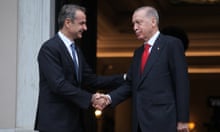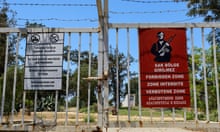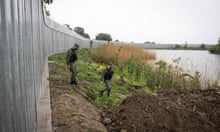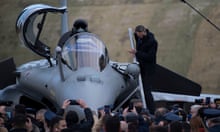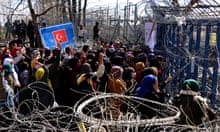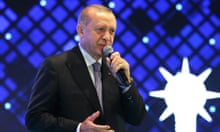The first victim of the worsening crisis that has engulfed Greece since Turkey’s abrupt decision to open its borders to thousands of refugees desperate to reach Europe has been confirmed with the death of a child in waters off Lesbos.
As Turkish leader, Recep Tayyip Erdoğan, warned that millions of people would soon be heading westwards, Greek authorities announced that a four-year-old Syrian boy had died when a dingy carrying 48 men, women and children capsized off the island.
“Doctors rushed to save the child but it was too late,” said a police source on Lesbos, adding that the inflatable had been deliberately slashed as it approached the isle so as to trigger a rescue operation.
The fatality underscored the dangerously escalating tensions between the two Nato neighbours and regional rivals.
It came as Greece continued to reinforce its borders, rushing elite forces, more soldiers and extra guards, to its eastern Aegean islands and the land frontier it shares with Turkey.
The Turkish coastguard released footage on Monday that showed Greek boats trying to stop a packed inflatable dinghy of migrants trying to reach European shores.
In the footage the Greek coastguard boats pull in front of the dinghy and men on board hit or prod the inflatable with a long pole or boat hook. In one clip a large boat passes quickly by, washing the dinghy with its wake, while in another warning shots are fired into the water near the migrants.
Earlier in the day police used teargas and stun grenades to thwart hundreds trying to cross into the country, either by traversing the fast-flowing Evros river that divides the two nations or through frontier fences along the north eastern border.
Amid mounting international alarm, the Greek prime minister, Kyriakos Mitsotakis, said he would visit the Evros region on Tuesday with top EU officials, including the EU commission chief, Ursula von der Leyen, and president of the European council, Charles Michel.
The trip is expected to be a show of solidarity for the embattled member state.
With senior figures in the ruling centre-right administration describing the attempts to breach the country’s borders as an “invasion” orchestrated at the highest levels of government in Turkey, Athens is leaning on Brussels for more support.
EU home affairs ministers will also meet in extraordinary session on Wednesday to discuss the increasingly dramatic situation.
“The borders of Greece are the external borders of Europe,” Mitsotakis tweeted late on Sunday after chairing an emergency meeting of the country’s national security council.
Greek officials announced that Athens had submitted a request to Frontex, the EU border agency, to mobilise its rapid border intervention force to assist in reinforcing the bloc’s external frontiers. Coastguard vessels manned by agency personnel and border guards were expected to arrive in the coming days.
Mitsotakis announced that Greece would also be suspending asylum applications “for one month” – a move that may have been the cause of diminishing numbers remaining at the land border.
Greek officials said 4,354 people had been stopped illicitly entering the country over a 12-hour period beginning at 6am on Monday.
But despite the unprecedented display of military muscle, at least 1,000 people succeeded in circumventing a flotilla of naval vessels and coastguard boats to reach Lesbos and other Aegean islands.
It is now believed that as many as 150,000 people have amassed along Turkey’s coast in the hope of crossing over to Greece’s outlying isles.
With Athens saying the country is facing “an asymmetric threat” to its security, military forces also began engaging in live fire exercises in Evros and other border regions. The exercises were interpreted as a covert effort to deter men, women and children from making the journey to Greece.
The crisis marks the worst deterioration in ties between the EU and Ankara since they struck a landmark accord in March 2016, in which Turkey agreed to host millions of displaced Syrians in exchange for €6bn in EU funds.
On Monday Erdoğan repeated that he had been spurred to “open the gates” because Europe had reneged on its promise to provide funds and assistance for the 3.7 million Syrian refugees currently residing in Turkey.
“I told them, ‘It’s done. It’s finished. The doors are now open. Now, you will have to take your share of the burden,’” he told an audience in Ankara. “Since we have opened the borders, the number of refugees heading toward Europe has reached hundreds of thousands. This number will soon be in the millions.”
Athens has accused Ankara of deliberately encouraging the mass movement of thousands of people towards Greece in what it has described as an open violation of the 2016 agreement it reached with the EU.
“Instead of restricting rings that traffic in migrants and refugees, Turkey herself has become a trafficker,” the Greek government spokesman, Stelios Petsas, told reporters after the emergency security council meeting. “These people are being used as pawns by Turkey to exercise diplomatic pressure.”
The emergency measures came after Greek security forces announced that a “titanic battle” was being waged to protect the nation’s borders.
On Greece’s eastern Aegean islands, which have experienced a big rise in the number of refugees and migrants arriving in recent months, a 52-strong flotilla of gunships and coastguard vessels has been seconded to protect them.
“Our borders are under huge pressure and, yes, they are big,” said Panayiotis Harelas, who heads the Panhellenic federation of border guards union. “But our determination to defend them is bigger.”

